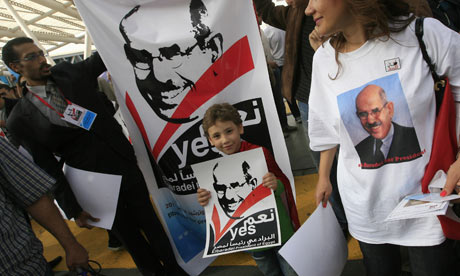
Most of Mohamed ElBaradei's support comes from the affluent and educated urban bourgeoisie. Photograph: Khaled Desouki/AFP/Getty Images
The final results of the recent parliamentary elections in Egypt promise five years of political irrelevance for the institutional opposition. With only 16 seats out of 504, opposition parties achieved the worst electoral result since 1990, when Egypt was experiencing a severe balance of payments crisis combined with widespread discontent over its alignment with the US in the war against Iraq.
The most important element in this disappointing outcome is the most obvious: the combination of systematic vote rigging and violence by security forces in support of the president's National Democratic party (NDP). But that does not entirely explain the patent failure of Egypt's institutional opposition.
Egyptian society is as vibrant as ever, we are often told. However, when discussing this vibrancy and the related desire for change, it appears that internal and external observers are talking of quite different things. On the one hand, the attention of external observers has been catalysed by Mohamed ElBaradei and by the ever-increasing power of new media. On the other hand, within Egypt, a similar function has been played by the waves of strikes and protests affecting urban centres, the industrial towns of the Nile delta and the countryside.
This mismatch in perceptions is closely related to the fact that Egyptian society is still deeply influenced by two traditional – and resilient – cleavages. The first separates upper classes from lower classes, and the second opposes urban and rural forces. The fourfold matrix resulting from the combination of these two distinctions helps us in understanding why my friend Khaled in Fayoum and I in London perceive things so differently, and why this disconnect between institutional and popular opposition harms the prospects for political change in Egypt.
The phenomena attracting external attention have consistently involved only the upper-urban section of Egyptian society. In the case of ElBaradei, it is no secret that most of his support comes from the affluent and educated urban bourgeoisie, and that one of his main weaknesses is his perceived elitism. When it comes to the supposed pervasiveness and thus real power of the Egyptian blogosphere, a quick glance at the ICT development report by the UN telecoms agency tells us that, while overall internet penetration in the country has increased dramatically over the last decade (reaching about one in five Egyptian households), the digital divide between the city and the countryside is far from being bridged, as only 3% of rural households had internet access by 2008.
This figure tells us a lot about the profile of most of the 160,000 Egyptian bloggers: again, they are affluent and educated city dwellers who enjoy what, for the vast majority, is the privilege of internet access.
In much the same way, the institutional opposition – in the form of political parties – is deeply entrenched in the same milieu, finding its core support in either upper-urban groups (the leftist Tagammu' and the liberal al-Ghad party) or in the upper-rural sections of society (as with the Wafd party, which historically represented large landowners). The Muslim Brotherhood, despite its huge potential for mobilisation, is still very much an upper-middle class conservative movement rooted among wealthy professionals and graduates in the larger cities.
Coming from and being largely limited to these social groups, the institutional opposition has been unable to comprehend, let alone represent, the two most relevant movements arising from lower social strata.
On one hand, the movement for workers' rights has gained significant concessions from the government since the first strikes in the textile sector in Mahalla al-Kubra in 2007, and has since gathered momentum and progressively extended its reach towards other manufacturing sectors. On the other hand, following the full implementation of Law 96 of 1992 – also known as "the law for throwing peasants out of their land" – that has to date led to the eviction of more than one million farmers, a peasant movement has emerged in the countryside, though it faces continued repression, as reported by Land Centre for Human Rights.
By its glaring inability to take these grievances serio
usly, the institutional opposition has condemned itself to continuing irrelevance in parliamentary life and has prevented a credible political articulation of the economic and social demands of both industrial and agricultural workers, ignoring that these movements could indeed constitute the much-needed popular support for a political opposition to the Mubarak regime.
Thus, it is not the split between secular and religious opposition, but rather the one between institutional and popular oppositions that constitutes the foundation for the survival – that's what it is: mere survival – of Egyptian authoritarianism. And whereas the positive reaction to ElBaradei's call for a boycott of the 2011 presidential elections is an encouraging sign, its impact will be minimal unless it resonates with those groups whose voice is rarely heard in Cairo's corridors of power.






No comments:
Post a Comment